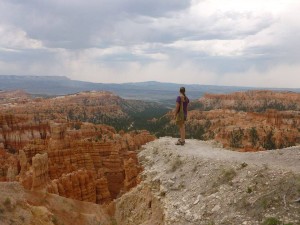What Makes a Choice? (Part I)
Jan 21st, 2015 | By admin | Category: Reproductive Rights/Women's RightsBy Kimberly Absher, guest youth blogger, www.howmany.org.
Promoting women’s health is my passion. My first exposure occurred in a community college class probably not titled Feminism 101, but it could have been. It blew my mind. I started volunteering at a YWCA day shelter for homeless and low-income women, set in an affluent corporate suburb of Seattle. Women could receive meals and hot showers, make phone calls, use computers, help themselves to professional clothes, and engage in group activities.I prepared meals and facilitated Bingo rounds, which were taken too seriously to appreciate my “B4…not after!” puns. Mostly I conversed with the clients, which mainly involved listening, or discussing whatever topic they brought up. I quickly learned not to ask too many questions, as usual “small talk,” questions like, “Where do you live?”, “Where do you go to school?” or “What’s your family like?” were often irrelevant or touched on emotional subjects, usually both.
Instead, I answered the many questions they asked me about my life, carefully forming my answers to minimize sounding like I was bragging while I explained that I would get together with family for the holidays, and yes, that is my car. My life had been far from perfect, allowing me to empathize with some of the women’s experiences, but my own emotional triggers seemed distant in the face of their unfolding hardships. It amazed me how much discussions were colored by privilege, and how that privilege created a distance between us that proved hard to close.
The Role of Personal Responsibility
When I worked at a summer camp, all of us camp counselors demonstrated the concept of choice to campers by walking around swinging our arms saying, “I get to choose what to do with my arms.” Then one of us would get too close to someone else and our flailing arms would hit them. We explained that we get to choose what we do unless it hurts someone else, and then we don’t get to do it.
I more or less still believe this today, but for me the concept of choice still has a great deal of complexity. Is someone who lives in a cult who has been indoctrinated with that worldview able to honestly exercise choice when asked if they want to leave? Is a partner who is being abused and threatened with violence against his/her children able to “decide” to stay or go?
Constraints on ChoiceIn a culture fond of a “pull yourself up by your bootstraps” mentality, the stories of the women at the shelter creep to mind. One was an accountant for a company until she was fired, and in fighting the termination she lost everything. Another was a housewife who became homeless after getting divorced. Another couldn’t survive financially under the weight of medical expenses. Abuse was a common theme, along with mental or physical illness, addiction struggles, legal problems…there are many factors that change the constraints in which choice exists. The economic recession exacerbated all of the situations, including impacting social services like the YWCA shelter. Several women lived in their cars, stacked with papers and items from their previous life.
In 2011, I spent a term in South Africa researching connections between sexual health and community development. Working in a small village with high teen pregnancy and HIV rates, my goal was to find out why youth were at such a high risk, and use my research to create a culturally-relevant sexual health education curriculum. Teen pregnancy is a red flag for HIV status (present or future), so I started there. I found that education and economic structures, gender dynamics, and conceptions about sexual health all contributed greatly to the dire statistics. Learning how limited the options were for many of the teens, the arguments I used previously to evangelize to American college freshmen about safe, consensual sex did not hold up. How could I effectively tout the importance of “making good decisions” in the face of all these factors?
Please stay tuned for Part II.
Kimberly is a youth guest blogger with the Institute for Population Studies. She is currently a freelance writer on topics relating to health, women’s rights, and social change. You may reach Kimberly at kimberlyabsherwrites@gmail.com.


